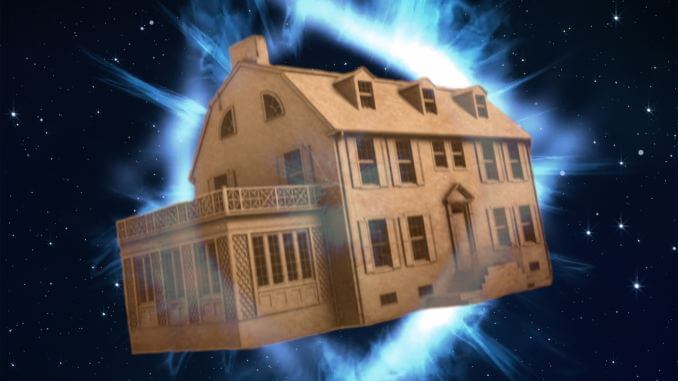Why Are There So Many Absurd Amityville Horror Movies?

In 1974, in a small village on Long Island, Ronald DeFeo Jr. killed his family. A month after he was convicted, the Lutz family moved into the old DeFeo house, then fled 28 days later, claiming a haunting. In 2022, nearly 50 years after the murders, the entertainment industry’s money-hungry dominoes have fallen all the way down to the release of a movie called Amityville Christmas Vacation. Exploitation cinema has tried to milk a buck out of Bruce Lee lookalikes, sexy nuns and the delusional devout convinced of their own oppression in God’s Not Dead, but no franchise nor subgenre comes close to the sheer strangeness of the nearly 50 films using The Amityville Horror as their selling point.
Fewer than ten films comprise The Amityville Horror pseudo-canon built since the 1979 “based on a true story” original adapted Jay Anson’s 1977 book. Ten films with “Amityville” in their title came out in 2022 alone. Those movies range from Amityville Karen to Amityville in Space, both of which are such a far cry from the DeFeos and Lutzes that it’s hard to even call them “exploitation.”
And that’s by design. There’s a bit of common horror wisdom surrounding the plethora of Amityville movies, absurd in both amount and subject matter: Because Amityville is a real New York town, and because the DeFeo murders—and, I guess, the Lutz family moving in and then out, regardless of their transparent attempts to cash in on claims of ghosts and ghoulies—were all documented in the public record, they couldn’t be contained as alluring intellectual property except under the specificities of Anson’s book. Hence, why the movies have taken turns away from haunted houses towards haunted rideshares and, yes, even haunted sex toys: The nuttier the twist, the less worried anyone has to be about getting sued.
But if you leave the assumptions behind for facts—taken from the 1989 lawsuit Lutz v. De Laurentiis, which saw family patriarch George Lutz sue Amityville II: The Possession and Amityville 3-D producer Dino De Laurentiis—it’s plain to see that there’s an easy-to-follow Amityville game plan for ambitious indie filmmakers like Marc “Amityville Klown Kar” Pearce, Shawn C. “Amityville Shark House” Phillips, Thomas J. “The Amityville Moon” Churchill and Mark “Amityville Island” Polonia.
First, there’s the marketing. De Laurentiis and the production companies behind Amityville II: The Possession screwed up by trying to get away with this ridiculous tag: “The Night of February 5, 1976, George and Kathleen Lutz and their three children fled their home in Amityville, New York. They got out alive! Their living nightmare shocked audiences around the world in The Amityville Horror.”
You know the Lutzes weren’t going to stand for that, but the Amityville II folks figured that out and changed the marketing to scrub any mention of the Lutzes. They also included an extremely believable statement for a movie called Amityville II: “This film is not a sequel to The Amityville Horror.”
Got it. Totally. The Amityville Horror? Amityville II has never heard of it. But more importantly, the legal findings were that the public at large simply didn’t associate Amityville and horror movies set there with the Lutz family or Anson’s book. They associated them more with the actual murders and the rumor mill, which exist separately from the Lutzes and their PR tour. “The mass murder in the Amityville house and its supernatural legacy were well publicized at the time, drawing the attention of newspapers, magazines, television reports, the Church, and resulting in another book, Hans Holzer’s Murder in Amityville,” the opinion reads, “and even plaintiffs do not dare claim to be the proprietary owners of all secondary associations resulting from this publicity.”
Basically, neither copyright law nor the law of unfair competition gives you a monopoly on “widely publicized events of public interest,” especially if some of those events are widely contested, imagination-sparking spook-‘em-ups. The judges found the Lutzes’ claims amusing, and at times, tossed a little sass their way: “Appellants’ suggestion that they will prove at trial that The Amityville Horror is associated in the public’s mind with the names George and Kathleen Lutz, is ludicrous.”
But even if it was associated with those two litigious hucksters, that would only make the guidelines for future horror hacks more clear. It’s all summed up in a damning explanation that opened the floodgates to any would-be Amityvillains. “The second and third pictures were not about the Lutzes, who had no monopoly on the creation of horror stories set in the house where the DeFeo murders occurred,” it reads. “This case is nothing more than an unjustified attempt by plaintiffs to arrogate unto themselves the right to commercially exploit the name of the town of Amityville to the exclusion of the literary, artistic, and commercial worlds.”
-

-

-

-

-

-

-

-

-

-

-

-

-

-

-

-

-

-

-

-

-

-

-

-

-

-

-

-

-

-

-

-

-

-

-

-

-

-

-

-








































